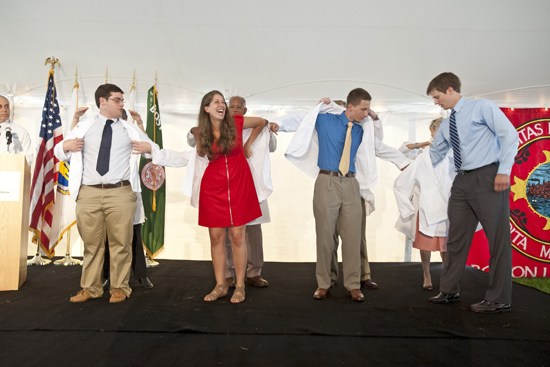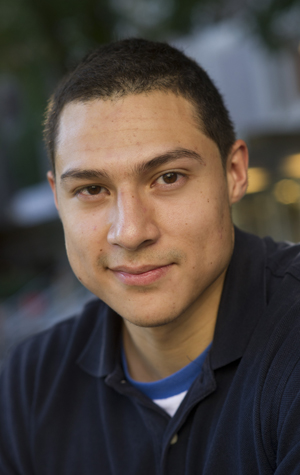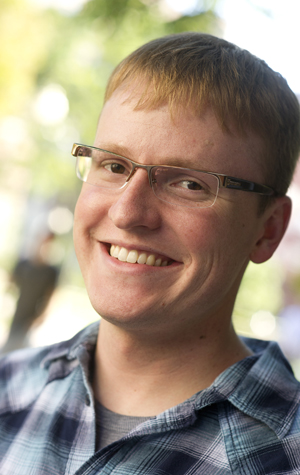谁想成为一名医生? 及其原因。
New MED students reflect shifting medical landscape

Members of the School of Medicine Class of 2015 were welcomed at the traditional White Coat Ceremony and Welcoming Reception at the Medical Campus on August 8. Photo by Frank Curran
Who wants to be a doctor?
The BU School of Medicine Class of 2015 is being groomed for a respected profession now in financial upheaval and plagued by what many believe is a worrying trend away from the traditional, often nearly lifelong doctor-patient relationships nurtured by primary care. But despite concerns about health care access and future loan debt, interviews with incoming MED students reveal optimism about a career that will enable them to serve not just their patients, but their communities.
Plucked from 11,400 applicants, the 173 members of the new class hail from 32 states and 19 nations. On August 8, at the storied White Coat welcoming ceremony, they recited the Hippocratic Oath, and then, lest the proceedings get too solemn, were reminded by Kitt Shaffer, a MED professor of radiology, that “being a doctor is the best job on the planet,” and that “if you’re not having fun, you don’t have the right attitude.”
And then the grind began. Already confounded by the demands of gross anatomy, many first-year medical students are eyeing specialty medicine right off the bat—it’s not uncommon for even premed students to be planning careers not just in, say, orthopedic surgery, but in hand surgery.

“I always worry about people having a fixed idea so early, making decisions based on a very incomplete understanding of themselves,” says Robert Witzburg (MED’77), a MED professor of medicine and associate dean for admissions. But in recent years, says Witzburg, MED and other medical schools that had routinely selected applicants most adept in the sciences are now choosing students based on a more holistic review.
“That changes everything about the admissions process,” Witzburg says. “It creates a structure in which every element of the application is considered in the context of every other element. The academic record is no longer looked at as a stand-alone item, but rather in the context of the applicant’s life experience, the adversities he or she has faced, the advantages he or she may have had.”
He says adopting the holistic approach is part of an effort to “educate more students interested in community health and primary care specialties.” But, he says, “in essence we just don’t know yet.”
Wh

The dramatic decline in primary care is compounded by an aging U.S. population and the expansion of health care access under the 2010 Patient Protection and Affordable Care Act, often referred to as Obamacare. A report by the American Academy of Family Physicians predicts a shortfall of almost 40,000 primary care providers by 2020. At the same time, the American Association of Medical Colleges estimates that among 2010 medical school graduates, average debt was almost $160,000, almost double the $87,000 in debt for graduates in 2002.
“There’s no doubt that students and residents tend to gravitate toward highly lucrative careers that are respected by their colleagues,” says Witzburg, an internist who as a young man turned down a prestigious cardiology fellowship. “And it’s common for people to turn their noses up at primary care after looking at primary care doctors struggling with paperwork and being paid poorly, and seeing other people doing high-class procedures, making disease go away in 60 minutes and being very well compensated for it. It’s not lost on medical students that these specialists are sought after by hospitals, have big fancy offices and big fancy cars, and live a different life than primary care doctors.”
Lifestyle issues
But it’s not just concerns about income that is causing the shift in the medical landscape, he says. There are lifestyle issues—dermatology and ophthalmology, for example, have virtually no emergencies. Writing in the New York Times, surgeon Karen S. Silbert recently made waves by suggesting that women who want to work part-time—there’s an increasing trend for doctors to split jobs—should choose a profession other than medicine.
他

Matthew McAdams (CAS’10, GRS’11, MED’15), of Vero Beach, Fla., believes that BU “actively selected our class for more humanism.” He and Luke Stevens (GRS’11, MED’15), of Winchester, Mass., completed BU’s master’s program in medical sciences, which they believe improved their medical school applications. They were thrilled to be accepted (it was McAdams’ second try), and they are allowing themselves to dream a bit, while coping with the much-dreaded anatomy lab. McAdams is interested in neurology; Stevens hopes to specialize in emergency medicine. Both expect to be well-compensated for their work, but as McAdams puts it, “if we wanted money, we’d go into business.” As for the prestige of being a doctor, “it’s not a bad thing,” says Stevens.
McAdams was drawn to medicine by his late grandfather, a general practitioner in rural Arkansas. He did house calls and sometimes took his grandson along. “I saw the magic in what he did,” says McAdams, who hopes to practice academic medicine, enabling him to have clinical hours, teach, and do research. He believes he probably “doesn’t have the wherewithal to perform surgery for 10 hours” and wants to work with people suffering from conditions like multiple sclerosis, neuropathy, and dementia—all of which have affected friends or family members.

“I’m committed to doing emergency medicine,” says Stevens, who completed EMT training as an undergraduate. “I have a short attention span.” And with an ER doctor acquaintance estimating he’d see 40,000 patients by the end of his four-year residency, Stevens decided the specialty would be a good fit for him. “They see about three patients an hour; they see everything,” he says, and they usher patients through initial diagnosis and treatment. With median salaries of nearly $247,000, ER doctors have an added lifestyle benefit. “It’s shift work,” he says. “You’re not committed to be on call for 100 hours a week or anything crazy like that. You work as hard as you can for the hours you work, and then you go home.” Most important to him is the notion that “in the ER you have a really big chance to make an impact on each and every patient—it’s an intersection between public health and medicine.”
晶澳
A weight lifter and soccer and basketball player, Rios is drawn to orthopedics, specifically sports medicine. “It’s really fascinating to me,” he says. Rios envisions working with professional athletes, maybe being a team physician. But he also expects, as he puts it, to “have a life.” Marriage and family were not among the most urgent concerns of the male students interviewed, but they were discussed often by female medical students. “We have been talking a lot about what we’re going to do about having a husband and kids,” says Rodericks. “It’s a really big concern. We’ve joked about hiring surrogates. With so many women doing surgical residencies, you’re talking about nine more years of your life.”

Committed to doing medicine
When their conversation alights on issues beyond their new regimens and surroundings, the students share many concerns, and one that’s foremost in their minds is the lack of access to health care. “Access is a big deal for me,” says McAdams. “I have a brother who doesn’t have health insurance, and when he has an issue, he comes to his younger brother, who’s not a doctor yet, for advice. Access is the biggest problem we’ll always face.” Dehaan, too, worries about access, especially for children. “I didn’t have health insurance for a while when I was growing up,” she says. “My mom doesn’t have health insurance.”
Just moments after explaining their plans to enter specific fields, all the students interviewed conceded that everything could change. “I’m told every day that in four years I might be doing primary care,” says Rodericks. McAdams often hears that he “might come out on the other side wanting to do something completely different.”
But as Stevens puts it, what’s important is that “we’re all committed to doing medicine in some way.”
Comments & Discussion
Boston University moderates comments to facilitate an informed, substantive, civil conversation. Abusive, profane, self-promotional, misleading, incoherent or off-topic comments will be rejected. Moderators are staffed during regular business hours (EST) and can only accept comments written in English. Statistics or facts must include a citation or a link to the citation.